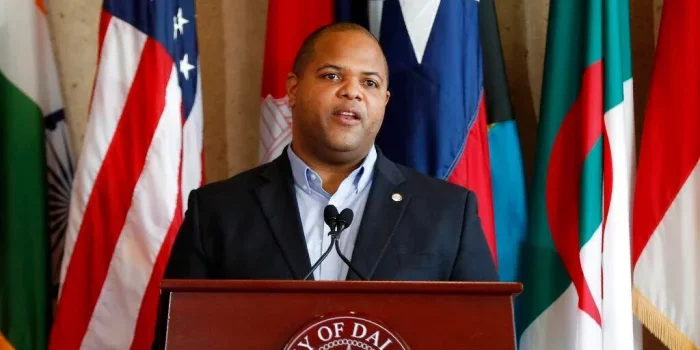(Two days after failing to convince the Dallas City Council to cut spending and taxes in its new budget, the Democrat mayor of Dallas switched parties to become a Republican.
On Wednesday, the Dallas City Council approved its FY 2023-24 city budget, and Democrat Dallas Mayor Eric Johnson voted against it.
He sought to ensure the budget kept a no-new-revenue property tax rate of roughly 68.13 cents per $100 valuation. The city council passed a $4.6 billion budget, including a property tax rate of 73.93 cents per $100 valuation.
“In an environment of such economic uncertainty for our residents and businesses, with inflation and interest rates being where they are, I simply could not vote for a budget that is the largest in the history of the city and that is paid for by raising taxes on our residents and businesses,” Johnson said on Wednesday, explaining his decisions to go against fellow Democrats.
“It is simply not the case that we could not have significantly reduced the size of this budget and cut taxes without drastically cutting essential services,” contradicting the claims made by proponents to increase taxes.
He also said, “it is preposterous to suggest that our city government could not, by being more efficient, deliver essential services next year using the same amount of tax revenue collected from Dallas residents and businesses just a year ago.”
Before becoming the 60th mayor of Dallas, Johnson served in the Texas House of Representatives as a Democrat from 2010 to 2019. During his four years as mayor, he’s sought to lower taxes and create a “friendlier business climate.”
One major accomplishment he’s championed is the city has reduced its property tax rate every year since he took office.
On Friday, he announced in a Wall Street Journal column that he had joined the Republican Party.
He said he has “no intention of changing my approach to my job” but is changing his party affiliation.
“Next spring, I will be voting in the Republican primary,” he wrote. “When my career in elected office ends in 2027 on the inauguration of my successor as mayor, I will leave office as a Republican.”
He said of his time in the state legislature that he took pride in “finding common-sense solutions and worked closely with my conservative colleagues to improve policing, public education and water infrastructure.”
Johnson said the party switch did not necessarily mark a change in his views, just a change in his affiliation.
“I was never a favorite of the Democratic caucus, and the feeling was mutual,’ he said.
“By the time I was elected mayor—a nonpartisan office—in 2019, I was relieved to be free from hyper partisanship and ready to focus on solving problems,” he continued. “But I don’t believe I can stay on the sidelines any longer. The future of America’s great urban centers depends on the willingness of the nation’s mayors to champion law and order and practice fiscal conservatism.”
Other mayors, including New York City’s Eric Adams, seem to have made overtures toward taking a more conservative approach to governing in the wake of the Biden administration’s failed policies, which have harmed lower class urban residents disproportionately. However, none have fully committed to switching parties until now.
“Our cities desperately need the genuine commitment to these principles (as opposed to the inconsistent, poll-driven commitment of many Democrats) that has long been a defining characteristic of the GOP,” Johnson said.
“American cities need Republicans—and Republicans need American cities” because “many of our cities are in disarray,” he added. “Mayors and other local elected officials have failed to make public safety a priority or to exercise fiscal restraint. Most of these local leaders are proud Democrats who view cities as laboratories for liberalism rather than as havens for opportunity and free enterprise.”
Johnson, throughout his tenure, has been a steadfast support of funding law enforcement and opposed movements to defund the police.
He argued that cities led by Democrats prioritize local tax dollars “on policies that exacerbate homelessness, coddle criminals and make it harder for ordinary people to make a living. And too many local Democrats insist on virtue signaling—proposing half-baked government programs that aim to solve every single societal ill—and on finding new ways to thumb their noses at Republicans at the state or federal level. Enough. This makes for good headlines, but not for safer, stronger, more vibrant cities.”
In response, Republican Party of Texas Chairman Matt Rinaldi said, “We are thrilled to have Eric Johnson join the Republican Party. In his tenure as Mayor he has set the example by fighting to lower property taxes, resisted efforts to defund the police and make Dallas safer. We look forward to working with him to make Dallas better.”
At a recent crime-fighting event held with Gov. Greg Abbott, Fort Worth Mayor Mattie Parker, echoed similar sentiments, saying, “These are difficult times in this country. You have large cities falling apart because they are not focused on public safety. The only way you have a thriving large city that is focused on quality of life is because of men and women who are willing to wear a uniform and carry a badge.”
Johnson said that despite switching parties, his priorities are the same: to make Dallas the safest major city in America, to have the best park system in Texas, and have the lowest taxes in north Texas.
Of the ten largest US cities all run by Democrats, Johnson is the first to switch parties to become a Republican. Doing so, he said, “is hardly a red wave. But it is clear that the nation and its cities have reached a time for choosing. And the overwhelming majority of Americans who call our cities home deserve to have real choices—not ‘progressive’ echo chambers—at city hall.”

